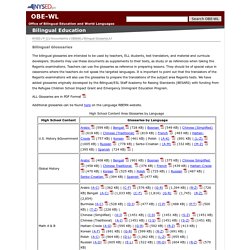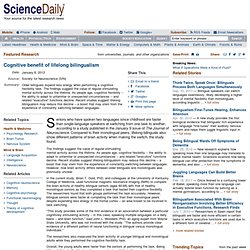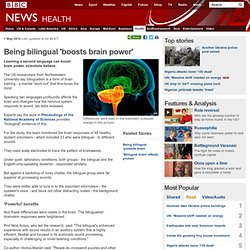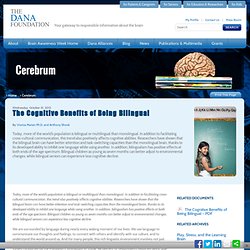

Bilingual Ed:Bilingual Gloassaries. The bilingual glossaries are intended to be used by teachers, ELL students, test translators, and material and curricula developers.

Students may use these documents as supplements to their texts, as study or as references when taking the Regents examinations. Teachers can use the glossaries as reference in preparing lessons. They should be of special value in classrooms where the teachers do not speak the targeted languages. It is important to point out that the translators of the Regents examinations will also use the glossaries to prepare the translations of the subject area Regents tests. We have added glossaries originally developed by the Bilingual/ESL Staff Academy for Raising Standards (BESARS) with funding from the Refugee Children School Impact Grant and Emergency Immigrant Education Program. ALL Glossaries are in PDF Format Additional glossaries can be found here on the Language RBERN website. Cognitive benefit of lifelong bilingualism. Seniors who have spoken two languages since childhood are faster than single-language speakers at switching from one task to another, according to a study published in the January 9 issue of The Journal of Neuroscience.

Compared to their monolingual peers, lifelong bilinguals also show different patterns of brain activity when making the switch, the study found. The findings suggest the value of regular stimulating mental activity across the lifetime. As people age, cognitive flexibility -- the ability to adapt to unfamiliar or unexpected circumstances -- and related "executive" functions decline. Recent studies suggest lifelong bilingualism may reduce this decline -- a boost that may stem from the experience of constantly switching between languages. However, how brain activity differs between older bilinguals and monolinguals was previously unclear. In the current study, Brian T. Overall, the young adults were faster than the seniors at performing the task. Being bilingual 'boosts brain power'
1 May 2012Last updated at 02:49 ET Differences were seen in the brainstem (coloured orange in this picture) Learning a second language can boost brain power, scientists believe.

The US researchers from Northwestern University say bilingualism is a form of brain training - a mental "work out" that fine-tunes the mind. Speaking two languages profoundly affects the brain and changes how the nervous system responds to sound, lab tests revealed. Experts say the work in Proceedings of the National Academy of Sciences provides "biological" evidence of this.
For the study, the team monitored the brain responses of 48 healthy student volunteers - which included 23 who were bilingual - to different sounds. They used scalp electrodes to trace the pattern of brainwaves. Under quiet, laboratory conditions, both groups - the bilingual and the English-only-speaking students - responded similarly. But against a backdrop of noisy chatter, the bilingual group were far superior at processing sounds.
The Cognitive Benefits of Being Bilingual. Today, more of the world’s population is bilingual or multilingual than monolingual.

In addition to facilitating cross-cultural communication, this trend also positively affects cognitive abilities. Researchers have shown that the bilingual brain can have better attention and task-switching capacities than the monolingual brain, thanks to its developed ability to inhibit one language while using another. In addition, bilingualism has positive effects at both ends of the age spectrum: Bilingual children as young as seven months can better adjust to environmental changes, while bilingual seniors can experience less cognitive decline.
We are surrounded by language during nearly every waking moment of our lives. We use language to communicate our thoughts and feelings, to connect with others and identify with our culture, and to understand the world around us. Cognitive Consequences of Bilingualism Bilingual people often perform better on tasks that require conflict management. Conclusion.